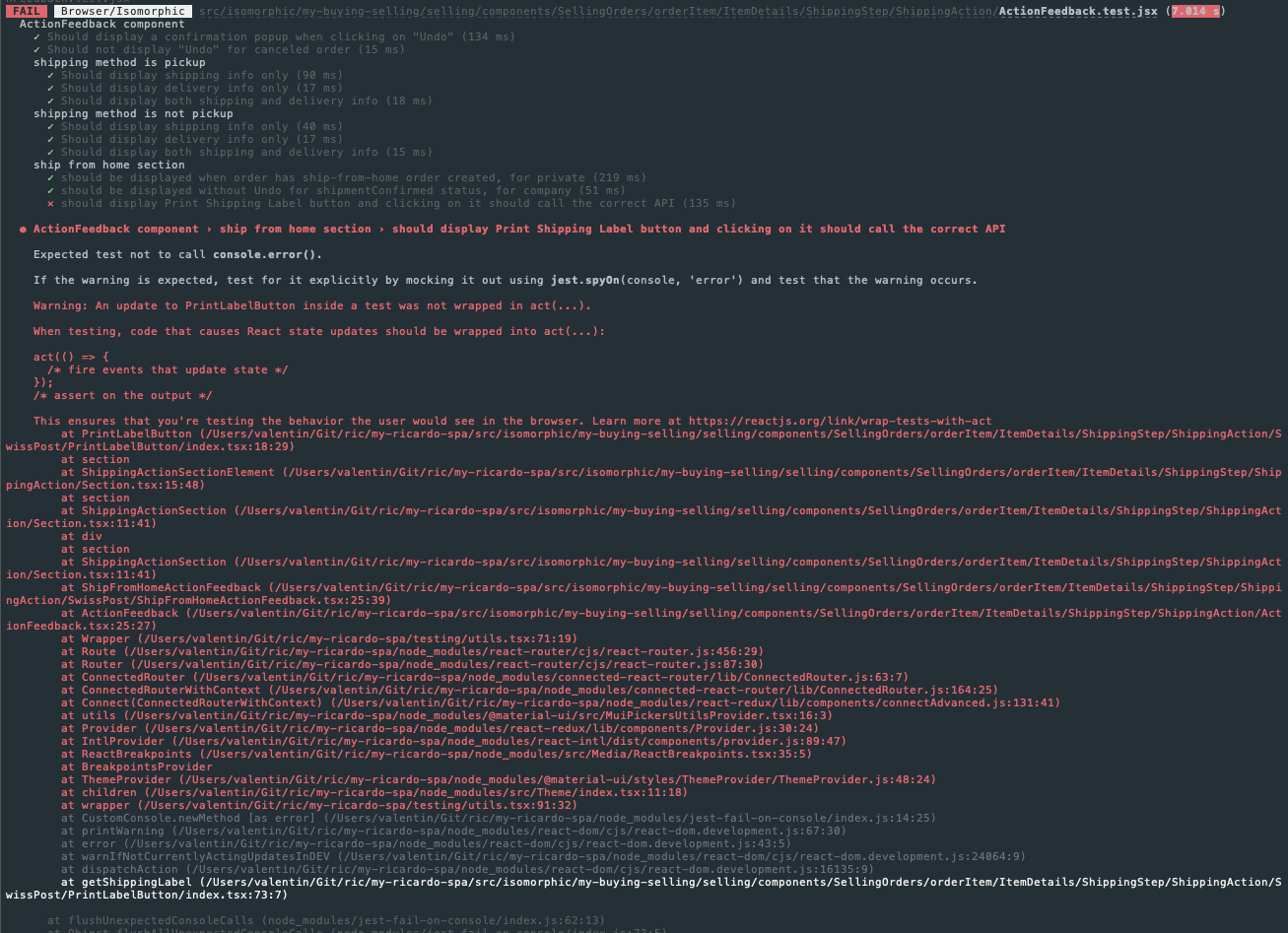jest-fail-on-console
v3.3.1
Published
Utility to make jest tests fail when console.error() or console.warn() are used
Downloads
1,517,896
Readme
jest-fail-on-console
Utility to make jest tests fail when console.error(), console.warn(), etc. are used
What problem is this solving?
Jest doesn't fail the tests when there is a console.error. In large codebase, we can end up with the test output overloaded by a lot of errors, warnings, etc..
To prevent this, we want to fail each test that is logging to the console. We also want to conserve a clear output of the original error.
This is what this utility is doing.

Downloads
Install
yarn add -D jest-fail-on-consoleor
npm install -D jest-fail-on-consoleHow to use
In a file used in the setupFilesAfterEnv option of Jest, add this code:
import failOnConsole from 'jest-fail-on-console'
failOnConsole()
// or with options:
failOnConsole({
shouldFailOnWarn: false,
})But I have some expected console errors/warning
If a console.error() is expected, then you should assert for it:
test('should log an error', () => {
jest.spyOn(console, 'error').mockImplementation()
// do your logic
expect(console.error).toHaveBeenCalledWith('your error message')
})Options
You can pass an object with options to the function:
errorMessage
Use this if you want to override the default error message of this library.
// signature
type errorMessage = (
methodName: 'assert' | 'debug' | 'error' | 'info' | 'log' | 'warn',
bold: (string: string) => string
) => stringshouldFailOnAssert
Use this to make a test fail when a console.assert() is logged.
- Type:
boolean - Default:
false
shouldFailOnDebug
Use this to make a test fail when a console.debug() is logged.
- Type:
boolean - Default:
false
shouldFailOnError
Use this to make a test fail when a console.error() is logged.
- Type:
boolean - Default:
true
shouldFailOnInfo
Use this to make a test fail when a console.info() is logged.
- Type:
boolean - Default:
false
shouldFailOnLog
Use this to make a test fail when a console.log() is logged.
- Type:
boolean - Default:
false
shouldFailOnWarn
Use this to make a test fail when a console.warn() is logged.
- Type:
boolean - Default:
true
allowMessage
// signature
type allowMessage = (
message: string,
methodName: 'assert' | 'debug' | 'error' | 'info' | 'log' | 'warn',
context: { group: string; groups: string[] }
) => booleanThis function is called for every console method supported by this utility.
If true is returned, the message will show in the console and the test won't fail.
Example:
failOnConsole({
allowMessage: (errorMessage) => {
if (/An expected error/.test(errorMessage)) {
return true
}
return false
},
})silenceMessage
// signature
type silenceMessage = (
message: string,
methodName: 'assert' | 'debug' | 'error' | 'info' | 'log' | 'warn',
context: { group: string; groups: string[] }
) => booleanThis function is called for every console method supported by this utility.
If true is returned, the message will not show in the console and the test won't fail.
Example:
failOnConsole({
silenceMessage: (errorMessage) => {
if (/Not implemented: navigation/.test(errorMessage)) {
return true
}
return false
},
})skipTest
Use this if you want to ignore checks introduced by this library for specific tests determined by
the return of the callback function. Return false if you do not want to skip console checks for
the specific test and return true if you would like to skip it.
const ignoreList = [/.*components\/SomeComponent.test.tsx/]
const ignoreNameList = ['some component some test name']
failOnConsole({
skipTest: ({ testPath, testName }) => {
for (const pathExp of ignoreList) {
const result = pathExp.test(testPath)
if (result) return true
}
if (ignoreNameList.includes(testName)) {
return true
}
return false
},
})shouldPrintMessage
Use this to print the message immediately when called not awaiting the test to finish. This is useful to show the message if there are other or earlier test failures which will result in the fail on console error to be hidden by jest.
- Type:
boolean - Default:
false
License
Maintainers
This project is maintained by Valentin Hervieu.
This project was originally part of @ricardo-ch organisation because I (Valentin) was working at Ricardo. After leaving this company, they gracefully accepted to transfer the project to me. ❤️
Credits
Most of the logic is taken from React's setupTests file.



